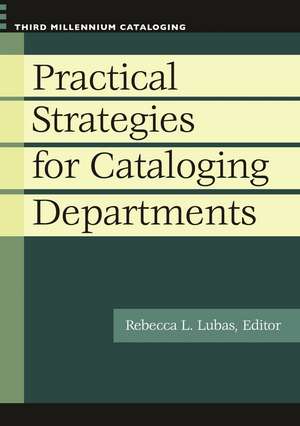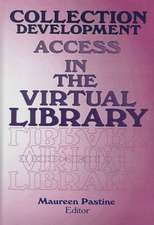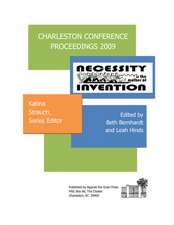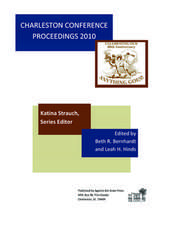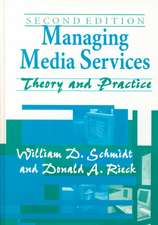Practical Strategies for Cataloging Departments: Third Millennium Cataloging
Editat de Rebecca L. Lubasen Limba Engleză Paperback – 21 feb 2011 – vârsta până la 17 ani
Preț: 262.32 lei
Preț vechi: 320.39 lei
-18% Nou
Puncte Express: 393
Preț estimativ în valută:
50.19€ • 52.55$ • 41.53£
50.19€ • 52.55$ • 41.53£
Carte tipărită la comandă
Livrare economică 07-21 aprilie
Preluare comenzi: 021 569.72.76
Specificații
ISBN-13: 9781598844924
ISBN-10: 159884492X
Pagini: 136
Ilustrații: 4 bw illus
Dimensiuni: 178 x 254 x 10 mm
Greutate: 0.27 kg
Editura: Bloomsbury Publishing
Colecția Libraries Unlimited
Seria Third Millennium Cataloging
Locul publicării:New York, United States
ISBN-10: 159884492X
Pagini: 136
Ilustrații: 4 bw illus
Dimensiuni: 178 x 254 x 10 mm
Greutate: 0.27 kg
Editura: Bloomsbury Publishing
Colecția Libraries Unlimited
Seria Third Millennium Cataloging
Locul publicării:New York, United States
Caracteristici
Provides real-life examples, case studies, guidelines, and model practices that demonstrate ways to bring cataloging services into the 21st century
Notă biografică
Rebecca L. Lubas is director of Cataloging & Discovery Services at the University of New Mexico Libraries, Albuquerque, NM, where she coordinates a group of catalogers working in many formats.
Cuprins
AcknowledgmentsIntroduction: Managing the Challenge of the Twenty-First-Century Cataloging DepartmentRebecca L. LubasChapter 1Evolving Standards: Making the Jump to RDA in Historical ContextRobert L. BothmannThe Fossil Record (or Historical Review)PrinciplesImplementation of AACR2AACR2 Transition to RDAMaking the LeapConclusionNoteBibliographyChapter 2Impact of Changes in Library of Congress Cataloging Policy on Working CatalogersBonnie ParksSeries Authority RecordsCurrent LC PracticeCurrent PCC PracticeNew MARC Series CodingCurrent Practice (http://www.loc.gov/catdir/pcc/Field440.pdf)Practical SolutionsCONSER Standard RecordHighlights and General Principles (from CSR Documentation July 22, 2009)Documentation and TrainingPractical SolutionsBIBCO Standard RecordHighlights and General PrinciplesDocumentation and TrainingPractical SolutionsProvider-Neutral Record for E-MonographsHighlights and General PrinciplesDocumentation and TrainingPractical SolutionsBibliographyChapter 3Managing a Multiplicity of Standards: Hybrid Approaches to Traditional and Digital CatalogingKevin Clair and Robert FreebornTraditional Cataloging StrategiesDigital Library Metadata: A Short HistoryNew ApproachesNew RolesNew Work FlowsNew TechnologiesProspective SolutionsBibliographyChapter 4Training Workshops: How One Trainer WorksJay WeitzChapter 5The Janus Effect: On-the-Job Training of Twenty-First-Century CatalogersDeborah LeeThe "What": What Should Be Included in the Training?The "How": The Order and Organization of TrainingThe "How": Training Delivery Methods, Assessment, and DocumentationThe "Where" and the "When": The Practicalities of TrainingThe "Why": Reasons to Catalog and the Rationale Behind Cataloging RulesConclusionNotesReferencesChapter 6Managing Vendor Cataloging to Maximize AccessRebecca L. LubasGetting StartedBut What about Those Crisis Situations?What Is Available?InvestigatePilot Projects and Scaling UpAssess and ReassessWhat Not to OutsourceSo, What Do You Do with All This Spare Time? Is It Worth It?ConclusionReferencesChapter 7Collaborating with Other Library DepartmentsSever Bordeianu and Rebecca L. LubasCollaborating Behind the ScenesAcquisitionsInformation Technology/Systems DepartmentsCollection DevelopmentColleagues on the Front LinesReferenceUser-Created TagsCirculation, Interlibrary Loan, and Document DeliveryInstructionBreaking BoundariesAdministrationDigital LibrariesBuilding the Skill SetReferencesChapter 8MARC: A New Life through Reusing and RemixingGlen WileySurvey of MARC Reused Outside the ILSLarge-Scale Digitization MaterialsElectronic Resources and Digital PortalsThe Semantic Web and Linked DataSpecialized Digital Library ProjectsProject Management for Repurposing MARCConsultingDesignMappingProductionAccess and ManagementConclusionReferencesChapter 9Moving Ahead with Metadata: Adding Value through Grant-Funded ProjectsAmy S. JacksonMetadata FundamentalsDescriptive MetadataWhat Else Do I Need to Know about Metadata to Help My Grant Application?How to Create Metadata for Your ProjectConclusionReferencesConclusion: Creating Collaborative Cataloging Communities in the Twenty-First CenturyRebecca L. LubasIndexAbout the Editor and Contributors
Recenzii
Recommended for cataloging department managers and cataloging educators, both in library school and on the job.
